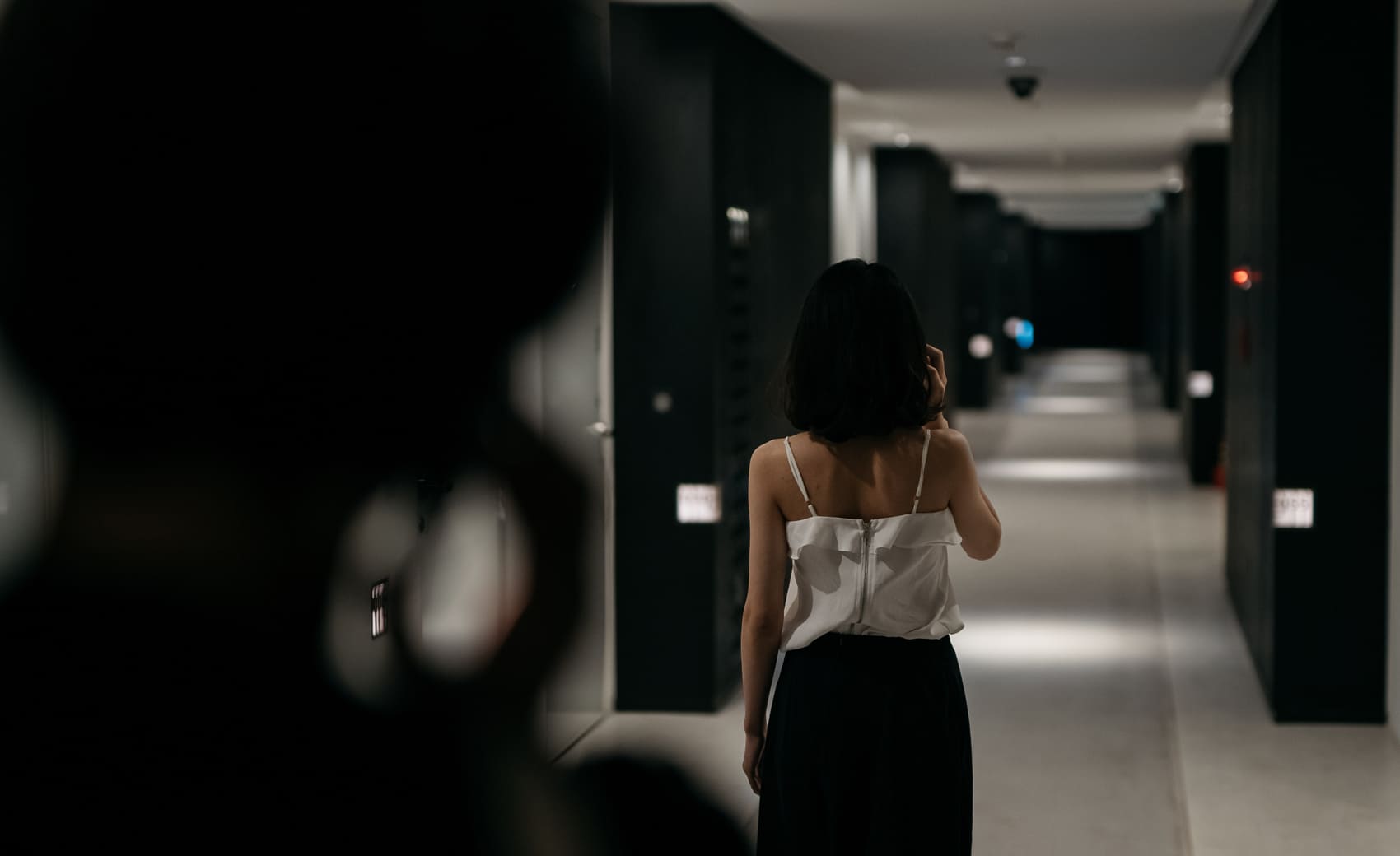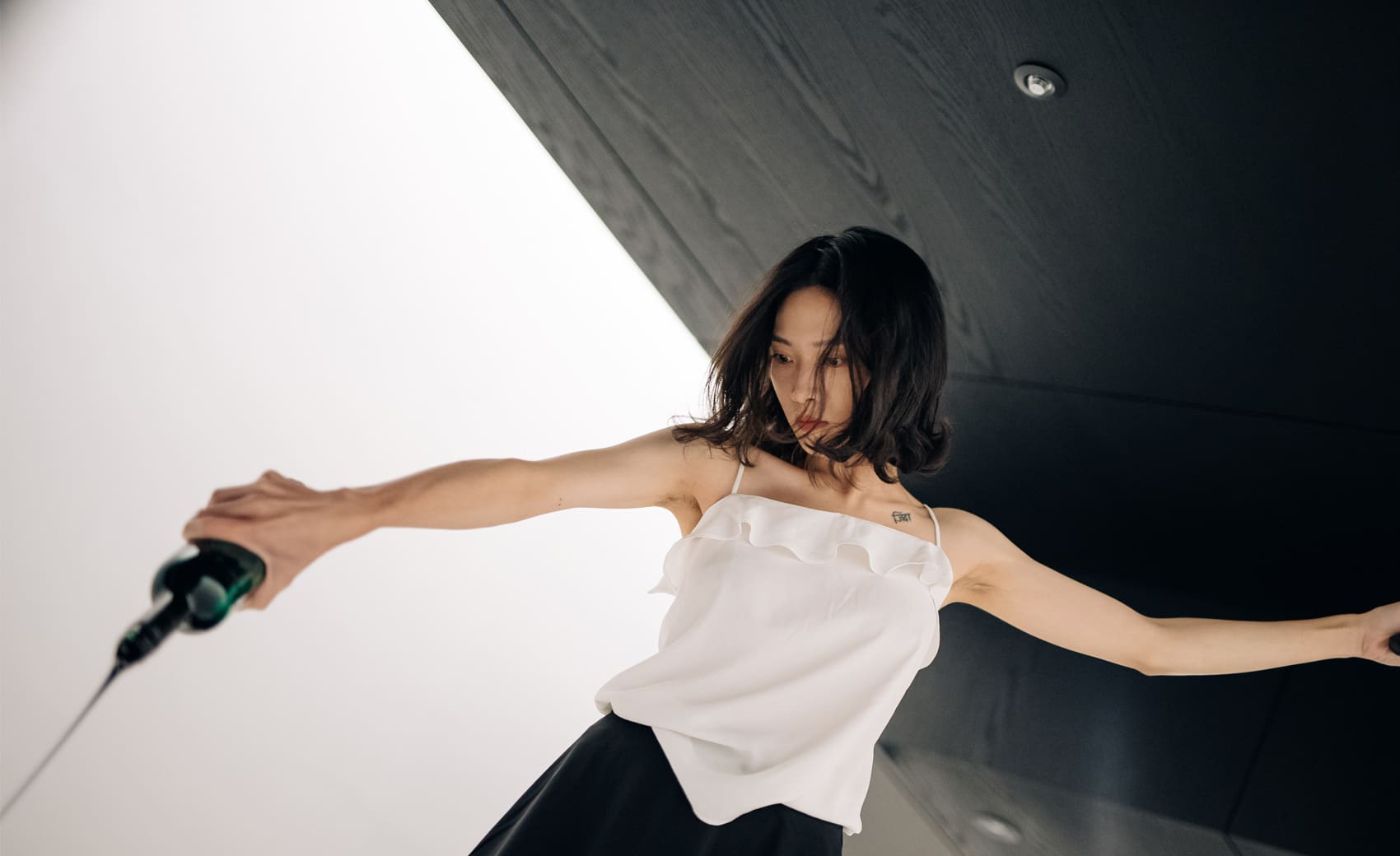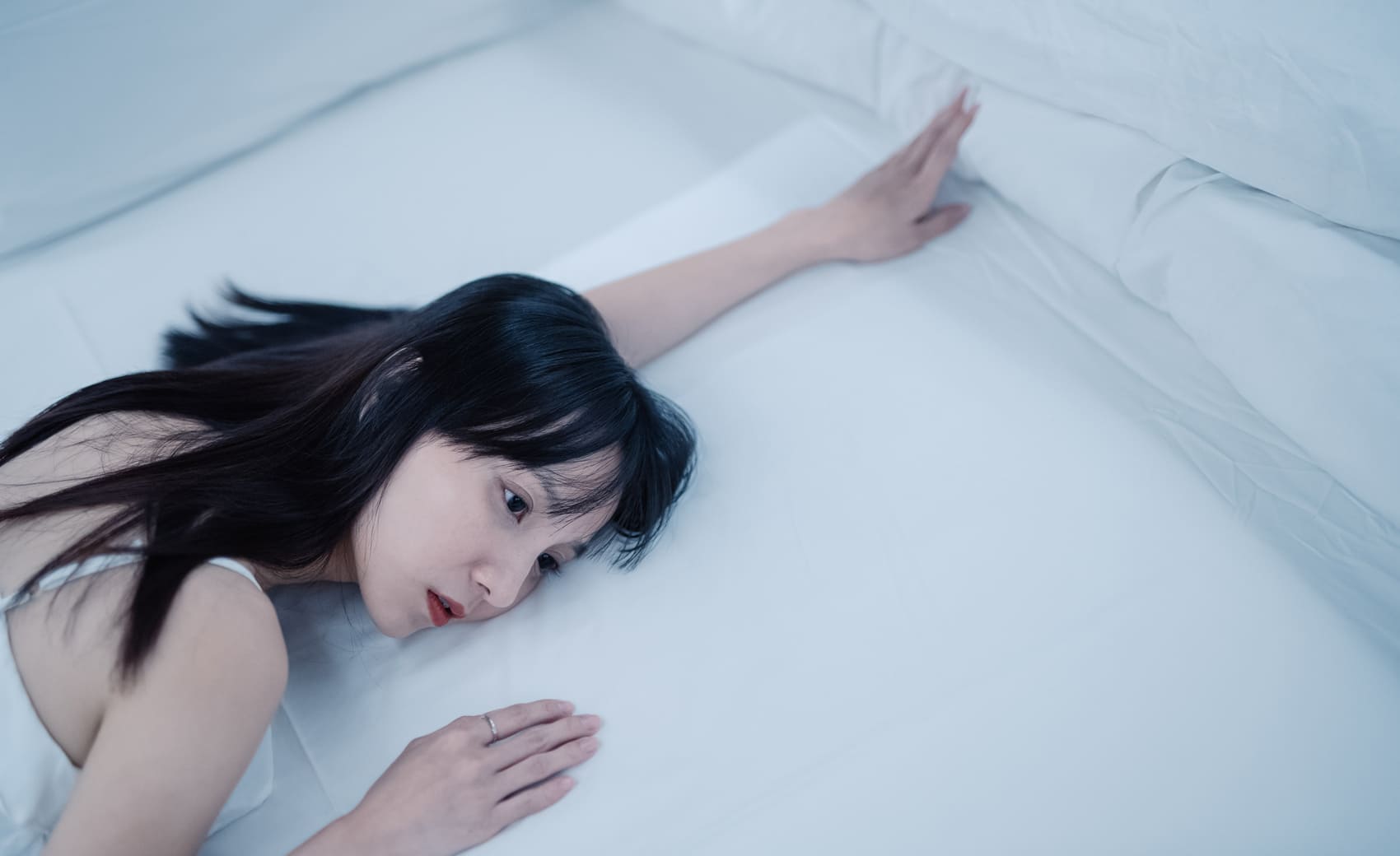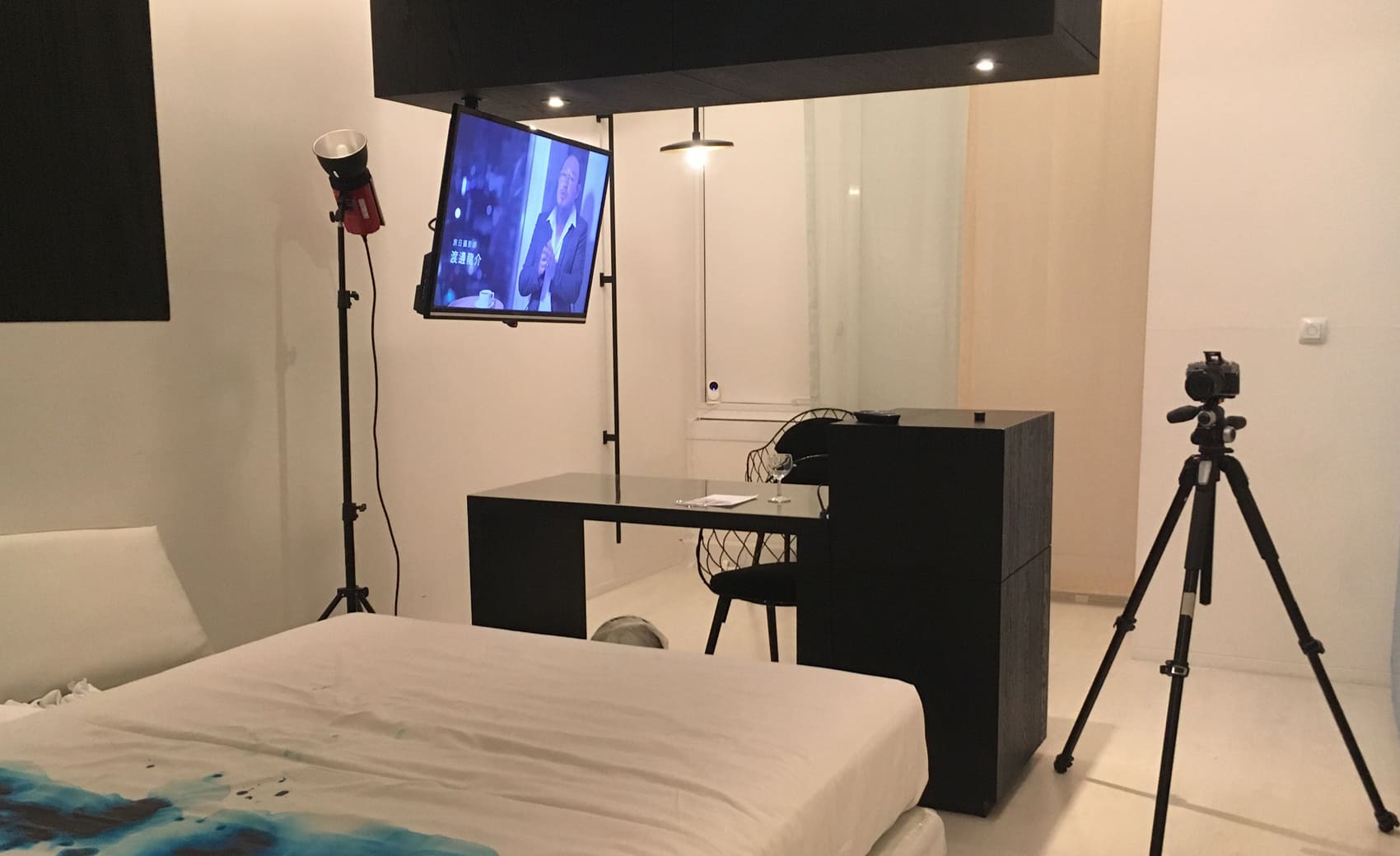劇名取自日本攝影師荒木經惟的攝影集標題,演出啟發自2018年#metoo事件延燒:曾與荒木經惟合作的模特兒Kaori,在社群媒體上發文,針對攝影者與被攝者的權力不對等關係,表達長年所經歷的勞動剝削與粉絲侵擾之苦。演出反從被攝者/創傷後倖存者的經驗出發,探問藝術作品在創作過程中涉及的倫理議題。演出以臺南老爺行旅的三個房間提供閱讀同宗事件的三種不同視角,將夢境中「重複」、「符號置換」的敘事策略,與創傷倖存者的經驗疊合,不斷在現實生活與夢境裡重演案發現場,拼湊碎裂的記憶。演出每次僅提供一位觀眾獨自體驗,觀者與表演者之間透過演出合約簽訂、手機對話與彼此的「對視」,引發對於藝術生產過程、藝術倫理、體制形構之階級與性別壓迫、創傷經驗的「媒介化」等議題的思考。
The title of the work comes from Japanese photographer Araki Nobuyoshi’s photobook, and draws inspiration from a #metoo incident involving the photographer in 2018—Araki’s model, Kaori, stated in her social media posts about the unequal power relations between the photographer and those he photographed as well as the long-term exploitation of her labor and harassment from fans that she has endured. The performance uses the experience of the photographed/traumatized survivor and poses questions about ethical issues in the process of artistic creation. The performance takes place in three individual hotel rooms in The Place Tainan to offer three separate perspectives to read the incident. Overlapping narrative strategies of “repetition” and “replacement of symbols,” elements that people experience in dreams, with the survivor’s experience, the work becomes a continuous revisit of the scene of the crime in real life as well as in a dream, piecing together the fragments of memory. The performance receives only one audience for an individual experience at a time, and utilizes a performance contract, cell phone conversations and the mutual “gaze” between the performer and the audience to facilitate thinking about the process of artistic production, ethics in art, class and gender oppression caused by systems and “mediatization” of traumatic experience.
再拒劇團
2002年由臺灣80後世代不同領域藝術家組成。團名源自亞洲許多神話中的「童神」記述,以包含「死與再生」和「變身思想」的主題概念敘述其出生、歷劫與回歸神聖的歷程,意指劇場表現原點本該破立創新,在不同媒介結合的感官體驗中,創造新的美學經驗。劇團持續實踐「聲音劇場」及非制式劇場空間的跨域作品,為當代劇場藝術激盪出更具實驗性的展演想像。主要作品包括《公寓聯展》、《接下來,是一些些消亡》、《諸神黃昏》和《渾沌詞典:補遺》等。
Against Again Troupe Founded in 2002 by artists born after the 80s and specializing in different fields, the name of the theater troupe originates from stories about the child-god, Nezha, in Asian mythologies that adopt the ideas of “death and rebirth” and “the concept of transformation” to depict his journey from birth, life challenges and returning to divinity. The name of the theatre troupe therefore indicates that theatrical endeavors should aim for shattering old practices to break new grounds while bringing together sensory perceptions enabled by different media to create fresh aesthetic experiences. The troupe has steadfastly realized “sound theater” and interdisciplinary work foregrounding non-standard theatrical space in hope of fostering more experimental theatrical imagination for contemporary theater arts. Their works include Against Again Apartment Showcase, All That's Left to Happen Is Some Deaths (My Own Included), Götterdämmerung, Dictionary of Chaos: Addendum and more.
黃思農、何采柔
黃思農
陳佾均
羅尹如
余佩真、康雅婷、張寗
陳亞琦
張以沁
唐健哲
戴開成
羅皓名
呂孟恂
台南老爺行旅
關鍵字
- 拍攝與被攝
- 創傷記憶
- 重複
- 觀看
- 創作倫理
- me
- too運動
- 單人體驗劇場
- 演出契約
藝術家談作品
#MeToo運動興起,帶動全球反思性侵或性騷擾議題。當這場社會運動進入台灣當代藝文圈,觸及創作倫理和產業結構的再省時,又會挑動怎樣的敏感神經?而當這些事件新聞如海潮流過媒體,我們被允許觀看他人私密痛苦,單純的注視是否真就事不關己?
採訪及文字整理/吳家瑀
#MeToo運動興起,帶動全球反思性侵或性騷擾議題。當這場社會運動進入台灣當代藝文圈,觸及創作倫理和產業結構的再省時,又會挑動怎樣的敏感神經?而當這些事件新聞如海潮流過媒體,我們被允許觀看他人私密痛苦,單純的注視是否真就事不關己?
#MeToo與當代藝術的體制論述
2018年,模特兒KaoRi響應#MeToo運動,發表一篇長文,控訴日本攝影師荒木經惟以藝術之名對她長期剝削、合作關係權力失衡。「我們的圈子不習慣講,也不習慣討論這類事情,即使你知道。」再拒劇團導演黃思農說,「過去台灣有林奕含和輔大心理系事件。近年表演藝術圈裡發生的就是韓國木花劇團事件。然後,當臺南藝術節策展人問我想要作的主題時,那時候發生的是華山草原分屍案。」回應廣泛的#MeToo事件,黃思農對於體制自覺的種種焦慮,促使他採取「以表演藝術自身檢視當代藝術的生產過程」開展此次《感傷之旅》。
對映著現實中以「私寫真」聞名的荒木,正是循前衛藝術修辭「反抗」西方古典裸女傳統,遂行其踰越自由,演繹創傷倖存者經驗的《感傷之旅》,也虛構了一名攝影師,在劇裡電視上侃侃而談如何以創作抵拒體制、反對他律束縛。黃思農藉此發出提問:「當一個藝術創作者聚焦於對人的肉身或意志的超越,又或者是對社會的抵拒,那他是不是使用了一些當代藝術修辭,去將他人受苦的經驗作品化?」這樣的提問,也是對再拒劇團創作脈絡的一種自我省思。
反動從自己開始:對應的權力關係
《感傷之旅》劇作排練過程中,「攝影師vs.模特兒」與「創作者vs.演員」的結構對應,讓黃思農更加警戒箇中權力關係:「我們永遠都在檢視,怎樣的創作過程比較不法西斯。」身為導演與劇組唯一男性,黃思農格外斟酌分際:「具體例子是,劇中有段是演員要賞自己巴掌,我不斷說可以更動表演文本,不用真的做,但是演員們蠻堅持的。」黃思農說,「他們覺得作品應該要往哪裡去,會建議怎麼做才比較有力量。」
作品概念共同發想者何采柔認為,這樣的過程,正是一種關係平衡的展現:「演員知道導演很小心在處理。演員們都很有經驗,所以知道在感覺舒適的狀況下,力道還可以再強一些」。另一方面,劇本的共同創作方式,也使得劇作發展過程中的權力流轉得以呈現:「文本中很多台詞是演員自己發展,比如羞辱人的字句那些……在發展文本時,演員也是創作者;去演繹這些文字時,她變成演員。某種程度上這呼應到創作者和演員的權力關係,過程中啟發她意識到這個問題。」
「注視」及其所意味
《感傷之旅》演示和反思的權力結構,不僅止於文本內容或團隊關係。「劇場它在希臘的字源裡面,其實就是『注視』的意思、觀看的地方。於我而言,劇場從一個儀式出發到現在的歷史,在不被觀看或者不被聆聽的狀況下,本身是不完整的,也無法成立。所以『注視』這個行為本身,就是我們不斷在這個敘事裡面想要建立的。」黃思農說。藉由每次演出僅放行一位觀眾,將觀眾拉進劇場空間,放大視覺感官經驗,突顯注視行為的意義:「演員怎麼做,會影響觀眾感知,讓他不斷調整自己與表演者距離,意識『我到底是參與了?還是我沒有參與?』」
觀眾對與自身與演員距離遠近、關係親疏的思辨,「某種程度上,使作品呼應到#MeToo事件」。黃思農說:「這個事件是很個人的創傷經驗。它跟一般社會運動不一樣,不是一群人上街呼喊口號,而是『我也是』的這個『我』在社群媒體響應。所以,到底這個個人經驗跟它的公共性之間有甚麼關聯?」
《感傷之旅》希冀觀眾體驗後,從而思辨觀看#MeToo事件中的距離,意識自己在權力關係裡的位置與責任。我們很多時候以為自己只是觀眾,沒有理由超越旁觀者立場,卻忽略所有的在場都有份量,所有的注視都加總於此刻成其結果。《感傷之旅》再現暴力的記憶殘骸,提出了「藝術」自身脆弱與體制結構的可能問題,不為反動而反動,只為重拾瓦解的彼此信任。
評審談作品
作品以最低限的素材,卻能鋪陳出不對等的權力和性別關係的結構,並能託引出對旁觀者位置的理解。
以旅館中三個一樣的房間做為一個事件因果的迴圈布局,影射明星攝影師和模特兒從權力關係發展出身體及尊嚴的藐視和性侵犯的事件。作品除了呼應近年的#MeToo運動之外,也透過情節的安排讓唯一的觀眾從過程中見證這種「合作的權力關係」是如何發展成形的。劇情利用床邊桌位、帶位員和手機的轉手,讓觀眾從事後現場反向回到事發當下,並在最後一刻被情節中受害者的角色人物直接以問句:「你還在阿?」置換成事件的證人。作品以最低限的素材,卻能鋪陳出不對等的權力和性別關係的結構,並能託引出對旁觀者位置的理解。 (主筆/吳介祥)
With three identical hotel rooms that form a loop of cause-and-effect, the work implies the power relation between a star photographer and his models, portraying the disregard of body and dignity as well as a sexual assault. In addition to echoing the #MeToo movement in recent years, the design of the plots also leads the audience to observe the formation of “co-conspiring power relations.” With a bedside table seat, an usher and the transferring of cellphones, the audience can trace the event in reverse from after the incident to the moment of the incident, and eventually becomes its witness when the victim in the story finally poses the direct question, “Are you still here?” Using minimum material, the work narrates an asymmetrical structure of power and sexual relation while inducing the understanding of bystanders. (Commentator: WU Chieh-Hsiang)







